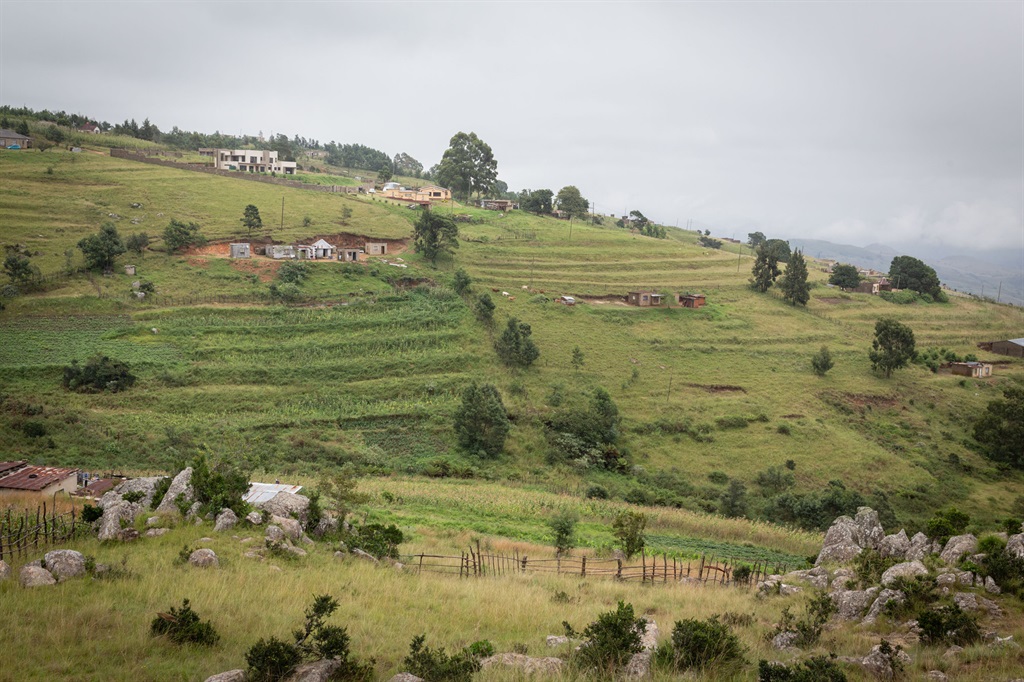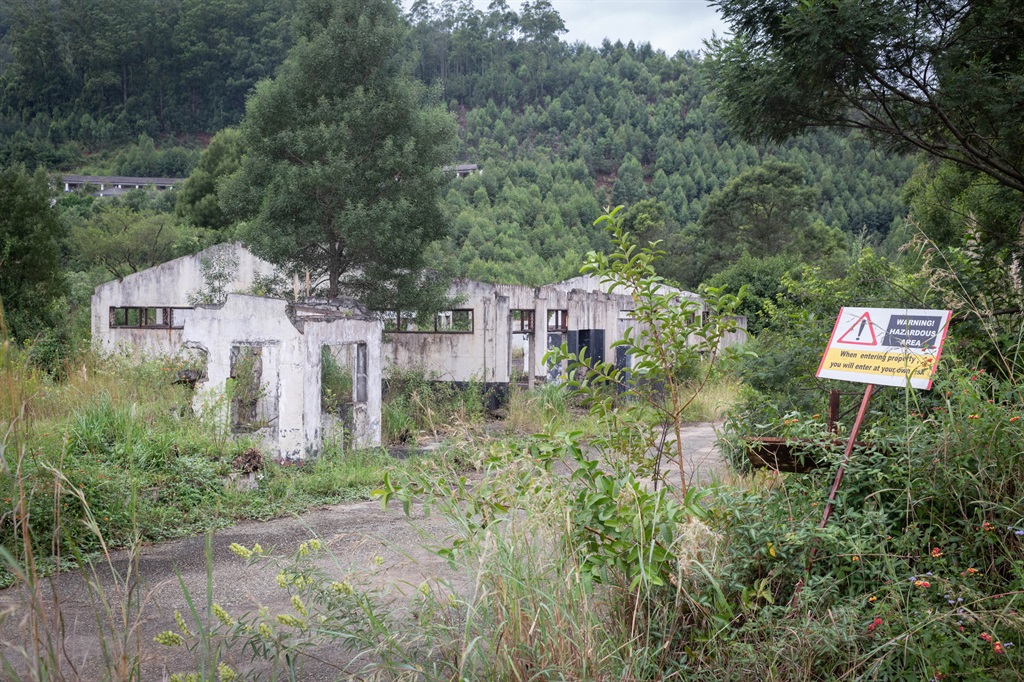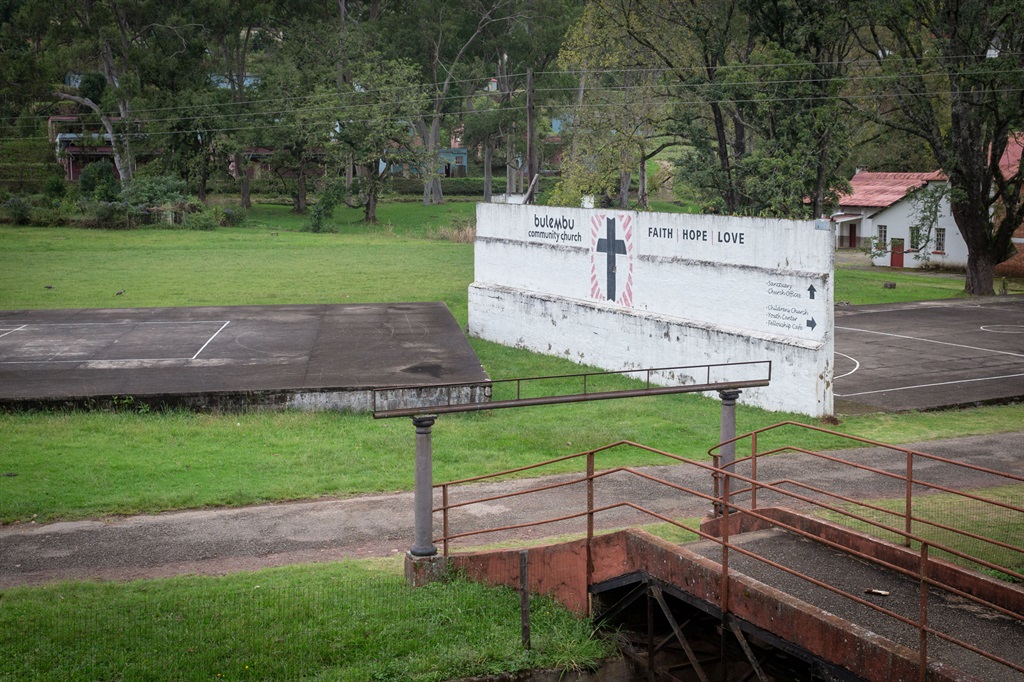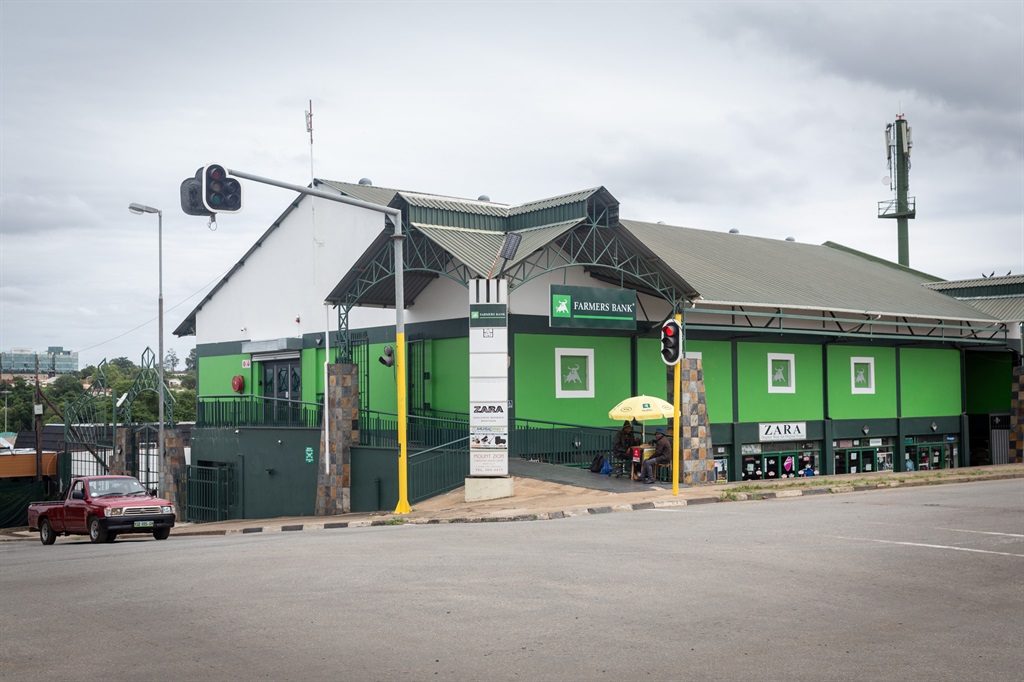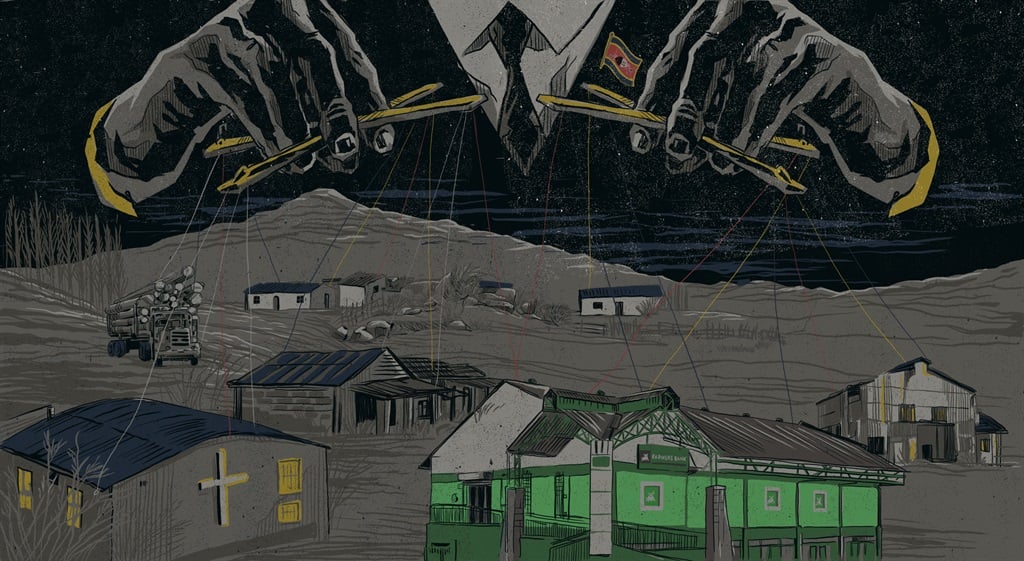
- An investigation by Finance Uncovered raises serious questions with the way a tiny Swazi bank was established.
- The documents from the "Swazi Secrets" leak also raise numerous questions about the two Canadian brothers who are the driving force behind it.
- Also revealed is the pressure allegedly brought to bear to give the bank a licence by political figures close to King Mswati III or claiming to act on the basis of a "royal command".
- For more financial news, go to the News24 Business front page.
The tiny town of Bulembu near the border with South Africa is an unlikely place for the opening of a bank branch. But Bulembu, which does not even have a petrol station, is home to one of two branches of Farmers Bank in Eswatini.
Employees of Farmers Bank in Bulembu and at its flagship branch in Manzini — Eswatini’s second largest city and its commercial centre — arrive every weekday morning for work, but there appears to be little more to do than water the potted plants and wait. The staff at the Manzini branch informed us they cannot authorise any transactions. Clients cannot yet open accounts, and no loans can be extended.
Farmers Bank was supposed to rival the big, established high-street banks operating in Eswatini — mostly South African banks — and ambitiously planned to install over 200 ATMs in its first 12 to 18 months.
But it’s essentially a bank in name only. For the past few years, it has been engaged in a tug-of-war with the regulator, the Central Bank of Eswatini (CBE), over its banking licence.
Leaked documents from the ICIJ's "Swazi Secrets" raise serious questions with the way in which the bank was established and financed and raise numerous questions about the two controversial Canadian brothers behind it.
They also tell the story of how the CBE seemed concerned by a litany of discrepancies in Farmers Bank’s application for a banking licence, and how, in trying to put the brakes on the process, the CBE allegedly ran up against the political interests of King Mswati III and the royal elite.
The investigation also reveals that the country’s finance minister, Neal Rijkenberg, appeared to have several indirect ties to the bank, placing him in a potential conflict of interest.
In fact, the bank’s very location in Bulembu — a town owned by the Christian nonprofit Rijkenberg founded and was made chairman of in 2018 — is one of several indications linking him to the bank and its Canadian owners.
When Finance Uncovered pushed Rijkenberg for detailed comment, his response was curt.
"Please be informed that without verifying or substantiating the validity or otherwise of the information contained in your emails, I cannot respond to questions on illegally obtained or leaked information as it would be a breach of the laws of Eswatini… I reserve my legal rights in respect of this matter," he warned.
Over 890 000 leaked documents from the EFIU were obtained by Distributed Denial of Secrets, a nonprofit devoted to publishing and archiving of leaks. The EFIU is an independent statutory body formed to "provide financial intelligence that safeguards the local and international financial system" from money laundering, terrorism financing and other illicit activity.
The EFIU was asked to assist with an investigation initiated by the CBE into Canadian brothers John Paul and Alexandre Asfar who seemingly appeared out of the blue on the scene in Eswatini looking to establish a bank.
This on its own was unusual given that neither had ever worked in a bank or owned a financial services business of any kind in the past. The two are sons of Egyptian-born real estate developer Najib Asfar, who died in 2011.
'A royal command', a litany of errors
John Asfar, also known as Jean Pierre or John Paul, had followed in the footsteps of his father and had become a real estate developer in Victoria, British Columbia. By August 2009, his Travellers Inn hotel chain was facing financial trouble. One of the largest hotel chains in the province, Travellers Inn was on the verge of bankruptcy, with creditors demanding CAD 60 million.
Asfar told local media that he had a plan to sell off some of his properties to settle with creditors and would offer them "100 cents on the dollar."
He said he had had enough of Canada’s government and tax system and would be moving to Africa to help the poor and orphans. The following month, Travellers Inn filed for bankruptcy.
Alexandre Asfar who is also known as "Sacha" appeared to follow his brother out to Africa in about 2016 where he established a base in George, South Africa.
In the bank’s application he states he is the owner and manager of many residential apartment buildings in Victoria B.C. and for 25 years has been involved in a tourism business called Mobimaps.
By 2016, Bulembu was already closely associated with Rijkenberg, who was at the time a prominent businessman in the forestry industry, two years before he became finance minister.
In 2004, the town was effectively taken over by the Bulembu Development Corporation, in which Rijkenberg was a director and shareholder. When the corporation’s plans to rehabilitate the town and attract new business fell through, the shares in the holding company that owned the property were transferred to Bulembu Ministries — the nonprofit founded by Rijkenberg.
With the backing of a Canadian donor (unrelated to the Asfar brothers) Bulembu Ministries aimed to breathe new life into the town by setting up social enterprises and an orphanage - although the donor pulled out in 2011 amid disputes about the direction of the project, effectively leaving it under the control of Rijkenberg.
As the town began to rejuvenate through church-driven projects, the Asfars went on their own manoeuvres across the border in South Africa. In August 2016, they started to create a complex network of newly incorporated companies, appointing themselves as directors.
In the space of four months, they created 14 companies using the address of Wynand Naude Attorneys in Northcliff, Johannesburg, as their registered office – though none of these companies would be directly connected to Farmers Bank.
The following year saw the emergence of Farmers Bank in Eswatini, according to findings contained in a 2022 report by the British arm of the U.S. financial and risk advisory firm Kroll.
Kroll was commissioned by the CBE to review the Farmers Bank matter. The report was obtained by Swazi Secrets partner Open Secrets.
According to the Kroll report, an unnamed CBE official said in an internal email correspondence that he received a request in "late 2016 or early 2017" from someone named Sikelela Dlamini to meet with "acquaintances of one of the princes" about the banking licence application process.
The official believed — though could not confirm — that the request concerned Farmers Bank.
On 14 July 2017, Majozi Sithole, the governor of the CBE, sat down for a meeting with then-minister of finance Martin Dlamini; the minister of agriculture; and unnamed businesspeople who wanted to set up a new bank in the kingdom.
There were early indications of a high-level interest in the venture when Sithole said he was given a "royal command" from the king to attend the meeting.
As the last remaining absolute monarch in Africa, King Mswati III holds an effective veto over all branches of government.
At the meeting, Farmers Bank applied for a banking licence. Over 500 pages long, it contained a litany of errors and discrepancies including audited financial statements that, according to the Kroll report, appeared to be of "questionable" integrity and reliability.
Our own investigation found names of proposed executives were misspelled, that their roles were mixed up and the financial statements of the parent companies were incomplete.
Key elements of the banks’ strategy were contradictory.
The bank intended to provide a "unique service to its agricultural customers". But on the page before that in the application, the bank said its loans would be "wholesale in nature and focused on creating financial products that suits the industrial needs of Swaziland in creating an Industrial Zone around the new Airport".
And while the bank stated in its application that it did not intend to receive deposits from the public, the application also said it planned to install a network of 200 ATMs through rural Eswatini.
Farmers Bank also said in its application that it was preparing to move into a glitzy four-story office building in George, South Africa, which it said would be called the Worldwide Corporate Center and would house "one of the most technologically advanced & largest Boardrooms in Africa."
But that building, under construction at the time, was owned by South African property company Dynarc, via a related company. Dynarc’s financial director, Vanessa Blom said a company that listed John Asfar’s brother as its sole director, was going to lease a large portion of the building. Blom says Dynarc mostly dealt with John Asfar and that neither Equity Check nor Farmers Bank ended up moving into the building. Dynarc obtained a judgment against Equity Check for breach of contract, says Blom, but her company has not been able to contact the Asfars.
The holding structure of the bank was unusual too.
Farmers Bank (Pty) Limited - the entity applying for the licence in Eswatini and of which the Asfar brothers were both directors, was 100% owned by a New Zealand company called Worldwide Capital Corporation.
Worldwide had only been established a few days before the application was submitted.
Worldwide in turn was owned entirely by a Canadian corporation called Tetrillion.
While the brothers were both directors of all the companies in the chain, Alexandre Asfar was listed as the sole shareholder.
But the CBE suspected John Asfar also had an ownership stake in the bank via Tetrillion, though it was unable to independently verify the parent company’s shareholding, notes the Kroll report.
As a director of Farmers Bank, John Asfar would have needed to submit personal financial records and a CV that the CBE required to perform a so-called "fit and proper assessment," which by the time the report was published in July 2022 it had still not materialised.
The Kroll report shows that throughout the process of seeking its banking licence, the CBE’s request for information regarding John Asfar’s role in Farmers Bank, and his failure to provide such, was a protracted and contentious issue for the regulator.
Money of unknown origins
In May 2018, according to the Kroll report, then-finance minister Dlamini informed the CBE that "while reporting on an assignment by His Majesty involving an investor whose intention is to establish a bank institution", the ministry had been given a "command" to investigate and review the licensing process for prospective banks.
Dlamini also questioned the CBE about its "reluctance" to issue banking licences.
In September, another "royal command" directed the CBE to grant a full commercial licence to Farmers Bank, the report said, though the CBE made this subject to certain conditions, which included additional information disclosures relating to Farmers Bank’s seed capital.
The CBE also had concerns about the ownership of the bank and had concerns about the "fitness and probity" of the Asfars "because of information obtained in the preliminary assessment of the application". The CBE asked the EFIU to assist in vetting the "directors, executives and parent companies".
In a similar way to what they had done in South Africa, the brothers established an array of corporate entities in the kingdom.
John Asfar was also a director in these Eswatini-based companies: Worldwide Capital Eswatini, Worldwide Law Corporation and Pentillion, the latter being the company which would later hold Farmers Bank’s "reserves" in silver bullion.
Pentillion was "outside of the immediate Farmers Bank corporate structure", but its "financial operations also appear to overlap with those of Farmers Bank" and it made monthly payments to the bank’s staff, the Kroll report said.
Yet Farmers Bank downplayed John Asfar’s involvement in the bank and claimed that his role was merely to "set up the bank", according to the Kroll report.
"Such a statement suggests that his role does not extend to involvement in the ongoing operations of Farmers Bank once it had been incorporated," it reads. "However, in respect to Pentillion alone, J. Asfar is intricately involved in the operations of this company and also in the management of Farmers Bank’s most significant asset, the silver bullion."
At the time of publication of the Kroll report, the CBE still had unresolved questions concerning the ownership of Farmers Bank. The fact that Farmers Bank was seemingly not only coy about the identity of who owned and controlled it, but also the source of its funding fuelled suspicion at the CBE.
At first, when it applied for its licence, Farmers Bank did not specifically disclose the origin of its funding but implied it would come via its ultimate parent company, Tetrillion.
According to the Kroll report, the original source of the Tetrillion money was unclear, and three years of audited Tetrillion financial statements only further muddied the waters.
"Our review of the information in these financial statements has identified accounting treatments for certain assets which do not appear to follow accepted accounting principles, as well as notes to the statements which are illogical, contradictory, and unclear," read the Kroll report. It concluded, "The integrity and reliability of Tetrillion’s financial statements appear to be questionable, which supports concerns raised by the CBE in its assessment report that the source of the Applicant’s seed capital had not been adequately evidenced or explained."
After enquiries by the CBE, Farmers Bank had claimed the seed money for the bank was from the inheritance Alexandre Asfar received from the estate of his deceased father.
According to the Kroll report, the bank then changed its story, saying there was no link between the seed capital and the inheritance, and that instead the money had come from the sale of properties in Canada — houses and apartment buildings — that Alexandre Asfar held through companies and a trust.
According to the Kroll report, the CBE found the about turn "perplexing".
It was in March 2018 that the CBE and EFIU contacted their South African counterparts, the Financial Intelligence Centre (FIC) to assist in the investigation of Alexander (sic) Asfar with regards to "an ongoing Banking Licence application".
As it turned out, between August 2015 and November 2017, Alexandre Asfar had transferred R132.87-million (CAD 12.6 million) in 15 payments to an account of South African lawyers Wynand Naude Inc — a conduit for Farmers Bank — with most of the money coming via two Canadian law firms.
Of that amount, over R100 million would be used to capitalise the bank.
But the Kroll report claims Farmers Bank was subsequently unable to adequately explain the source of five such international transfers, amounting to R47 million, three of which had "no established link" to the sale of properties that the bank claimed the money derived from.
Kroll also found that there were missing wire confirmations, and although Farmers Bank repeatedly told the CBE that the properties from which the seed capital allegedly derived were owned by Alexandre Asfar, it provided no documentation to show that he was the true owner.
In December 2018, the Asfars had the money wired from Naude’s attorney account to the bank account of Worldwide Capital in Eswatini. From there, in February 2019, E 101 million (equivalent to R101 million as the exchange rate is pegged at 1:1) was deposited at the CBE.
This was flagged by Kroll given that Worldwide Capital Eswatini had no direct link to Farmers Bank - the entity that applied for the banking licence.
What happened next was even more unusual.
After being deposited with the CBE, the funds started to leave in June, going to two companies in the Asfars’ control. Pentillion received the majority of the funds, approximately R89 million. Another R12 million made its way to Worldwide Law Corporation.
None of the funds appeared to have landed in the account of Farmers Bank and by September 2019, the funds transferred to Pentillion had left the country to purchase silver bullion, seemingly from Rand Refinery in South Africa.
Three purchases amounting to nearly R89 million over the course of the month meant that the bulk of funds earmarked for Farmers Bank had been used up.
Kroll reported, "Based on documentation provided to the CBE by the Applicant, Farmers Bank contracted with Pentillion ES, a company associated with J. Asfar to acquire and hold custody of the silver bullion that was to form the majority of Farmers Bank’s capital reserves… Farmers Bank also subsequently entered into an asset management agreement with Pentillion ES in August 2019, whereby Pentillion ES agreed to "manage" the silver bullion on behalf of Farmers Bank."
The CBE had two main concerns relating to the conversion by Farmers Bank of its capital into silver bullion.
Firstly, that John Asfar, through Pentillion’s control of the bullion, ultimately controlled Farmers Bank but had not completed a "fit and proper" assessment as required by banking regulations. Secondly, whether the bullion really existed as an asset of the bank.
Asfar declined to respond to all of our questions, including whether he has ever submitted the information relating to his fit and proper assessment.
Kroll noted, "The audited financial statements of Farmers Bank also do not provide comfort around the existence of the silver bullion. Despite the significant value of the silver bullion held on behalf of Farmers Bank by Pentillion, the auditors of Farmers Bank’s financial statements did not perform procedures to independently verify the existence of the assets, Farmers Bank’s control of them, or the reasonability of the valuation thereof."
A finance minister’s mysterious connection
In October 2020, after Farmers Bank failed to meet the conditions of its licence, the CBE notified both Farmers Bank and the new minister of finance, Neal Rijkenberg, of its decision to revoke the licence "on the basis that Farmers Bank had failed to satisfactorily demonstrate the source of its seed capital and that it had failed to commence operations within the prescribed twelve-month period".
Two days after learning its licence had been revoked, on 7 October 2020, Farmers Bank notified Rijkenberg of its intention to appeal the CBE’s revocation of its licence.
According to media reports, when the appeal was lodged, Rijkenberg, who as finance minister would normally have heard the appeal, recused himself. He appointed the Minister of Commerce, Industry and Trade, Manqoba Khumalo, to adjudicate the matter. The reports did not include Rijkenberg’s reason for recusing himself.
In an initial response to a question regarding his recusal, Rijkenberg stated:
In December Khumalo determined that Farmers Bank should retain its licence and that there was "no compelling reason to doubt the source of funds".
The CBE objected to the unprocedural way in which the appeal was conducted, specifically that "the appeal was conducted in the absence of the regulations governing the process" — a claim backed up by the Kroll report.
Beyond that, the Kroll report cast doubt on Khumalo’s idea that there was "no compelling reason to doubt the source of funds" by demonstrating in detail the inconsistencies and omissions in Farmers Bank’s explanation of the source of its money, in addition to the lack of transparency in the bank’s corporate structure.
Nevertheless, in January 2021, the month after Khumalo’s ruling, the CBE reluctantly reinstated Farmers Bank’s licence, conditionally, giving Farmers Bank until January the following year to begin operating and insisting that it provide "financial statements of all individuals and companies directly or indirectly linked to the initial capital" and three months' bank statements from all bankers of the bank’s main shareholder, Alexandre Asfar.
As that deadline approached, however, Farmers Bank requested a nine-month extension. The CBE gave it only two and cautioned that it had still not provided documents to substantiate the source of its initial capital.
In February 2022, Farmers Bank wrote to Rijkenberg seeking his intervention in the "impasse" with the CBE. It is unclear what, if anything, Rijkenberg did, but just two weeks later, the CBE changed its position and allowed an extension to September 2022.
The Kroll report, which was completed during that time, could not find any rationale for the extension.
There are several records in the leaked documents linking Farmers Bank to the finance minister, creating at least the perception of a potential conflict of interest.
A March 2019 import permit for Pentillion — the company that would hold the bank’s reserves in silver bullion — gave the company’s address as Usutu Mill in Bhunya. The mill is owned by Montigny, a forestry company that Rijkenberg founded in 1997 and which he still has a stake in.
Bank statements also reflect various payments involving Rijkenberg and the nonprofit he founded, Bulembu Ministries, and entities linked to Farmers Bank.
The payments were relatively small but showed a link between the finance minister and those behind the bank.
Bank statements from 2019 to 2021 show that both Worldwide Capital Corporation and Pentillion — two of the companies tied to the Asfars — made multiple payments of differing amounts to Bulembu Ministries. These were usually several thousands of rands.
And bank statements reflect one payment to Worldwide Capital of R13,500 on 29 March 2021 referenced "Neal Rijkenberg".
Rijkenberg’s name also appeared as a reference on a 29 November 2019 payment of R11 000 to Farmers Bank chairperson Nhlonipho Dlamini who, while employed at Farmers Bank, was also being paid monthly on retainer by Montigny-owned Usutu Forest Products as a "consultant".
When approached with these allegations, Rijkenberg declined to provide answers "on illegally obtained or leaked information as it would be a breach of the laws of Eswatini".
'Shell bank'
Back in 2019, First National Bank, where Farmers Bank had two accounts, decided that it did not have the appetite for the risks associated with Farmers Bank and terminated their relationship, citing "inconsistencies… pertaining to the client’s KYC documents".
KYC refers to "know your client" — the obligatory steps required for a bank to verify a client.
According to a note contained in the leaked EFIU records, First National Bank believed that Farmers Bank had contradictory documents about its Swazi directors and this gave rise to suspicion that Farmers Bank was just a "shell bank" — in other words, a bank created for reasons other than its stated purpose and potentially used as a vehicle for hidden financial manoeuvres.
"If you control a bank, you control the reporting mechanism, so you can move all sorts of money in and not raise red flags with authorities," says Paul Holden, a financial crimes investigator who gave evidence before the Zondo commission regarding the flow of Gupta funds.
The Kroll report revealed that in a letter dated 18 June 2019, Farmers Bank explained that while its plans to commence operations were at an "advanced" stage, these had been hampered by several unforeseen challenges, including allegedly anticompetitive behaviour by FNB in Eswatini.
Farmers Bank alleged that FNB had frozen funds held in an account there that were intended to be used as Farmers Bank’s seed capital. The letter also criticised the CBE for failing to intervene in the dispute with FNB, and for allegedly impeding efforts by Farmers Bank to connect to the SWIFT cross border payment system.
Alexandre Asfar did not respond to our requests for comment.
John Asfar did not reply to our questions, but said, "For the record, 99.99% of each question/subject is a false narrative that has either been spun or has been designed to libel the Bank and its shareholding first, and this country second; and I have now had the chance to escalate and relay this to the Leadership in the country."
He threatened to sue for libel should we publish "this false narrative" which he equated to "financial terrorism against a Commercial Bank".
Farmers Bank’s South African lawyers, Wynand Naude Inc, were yet another cause for concern.
Because the money flowed through South Africa, the EFIU’s South African counterparts, the Financial Intelligence Centre, were able to screen the law firm and found a small number of suspicious transaction reports. (In 2023, the firm’s eponymous founder was suspended from practicing as an attorney by the Legal Practice Council (LPC). The LPC did not provide any further information on the suspension, but it appears from court documents that it might have been related to Naude operating without the fidelity fund certificate required to handle clients’ money.)
Prior to his suspension, his practice was acquired and absorbed into another law firm.
Wynand Naude did not respond to our request for comment.
Both the CBE and the Eswatini Financial Intelligence Unit declined to provide answers to specific questions raised in our investigation, instead opting to say "We will not respond to questions regarding information illegally obtained."
Meanwhile, years after Farmers Bank opened in Manzini, in a shopping arcade overlooking a busy junction, employees still dutifully show up to work. There are no customers in the branch, only staff with seemingly nothing to do. They say they hope to be up and running as a normal bank sometime this year.




 Publications
Publications
 Partners
Partners





